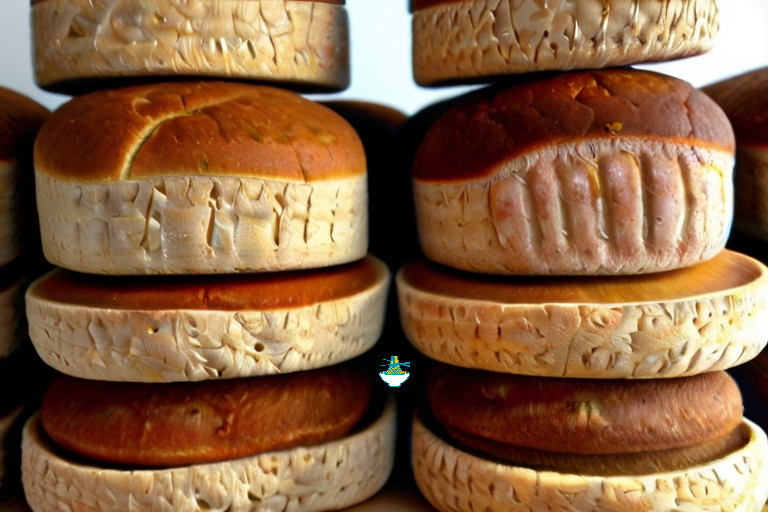Embark on a flavorful exploration of Estonia's culinary heritage with "Estonian Leib." This documentary delves into the heart of Estonian culture through its most beloved staple: bread. From ancient traditions to modern techniques, follow the journey of leib, the traditional Estonian bread, as it weaves through the country's history and society.
Discover the meticulous craftsmanship behind each loaf, from the selection of locally sourced grains to the artful baking methods passed down through generations. Meet the passionate bakers who dedicate their lives to preserving Estonia's bread-making traditions while infusing innovation into their craft.
Through stunning visuals and intimate interviews, "Estonian Leib" captures the essence of Estonian identity, celebrating the role of bread not only as sustenance but as a symbol of community, resilience, and cultural pride. Join us on this mouthwatering odyssey through the flavors and stories that define Estonia's rich culinary landscape.
Here's a traditional recipe for Estonian Rye Bread, also known as "Eesti leib," a staple of Estonian cuisine:
Ingredients:
- 500g rye flour
- 250g wheat flour
- 1 package (7g) active dry yeast
- 1 ½ teaspoons salt
- 1 tablespoon molasses or honey
- 500ml warm water
- 1 tablespoon caraway seeds (optional)
- Rye flour or cornmeal for dusting

Instructions:
Activate the yeast: In a small bowl, dissolve the yeast and honey (or molasses) in warm water. Let it sit for about 5-10 minutes until it becomes frothy.
Mix the flours: In a large mixing bowl, combine the rye flour, wheat flour, and salt. If using caraway seeds, add them to the flour mixture.
Combine the ingredients: Make a well in the center of the flour mixture and pour in the activated yeast mixture. Stir until the dough comes together.
Knead the dough: Transfer the dough to a floured surface and knead it for about 10-15 minutes until it becomes smooth and elastic. You may need to add a little more flour if the dough is too sticky.
First rise: Place the dough in a lightly oiled bowl, cover it with a clean kitchen towel or plastic wrap, and let it rise in a warm place for about 1-2 hours, or until it doubles in size.
Shape the loaf: Once the dough has risen, punch it down to release the air bubbles. Shape it into a round or oval loaf and place it on a baking sheet lined with parchment paper and dusted with rye flour or cornmeal.
Second rise: Cover the shaped loaf with a clean kitchen towel and let it rise again for about 30-60 minutes, or until it has doubled in size.
Preheat the oven: While the loaf is rising, preheat your oven to 200°C (400°F).
Bake the bread: Once the second rise is complete, slash the top of the loaf with a sharp knife to allow for expansion during baking. Bake the bread in the preheated oven for 35-45 minutes, or until it sounds hollow when tapped on the bottom.
Cooling: Transfer the baked bread to a wire rack to cool completely before slicing. Enjoy your freshly baked Estonian rye bread with butter, cheese, or your favorite toppings!
This hearty and flavorful bread is perfect for any meal and will surely become a staple in your own diet, just as it is in Estonia.
Nutritional Values:
Here are the approximate nutritional values for the main ingredients used in the Estonian Rye Bread recipe:
Rye Flour (500g):
- Calories: 1,750
- Protein: 50g
- Carbohydrates: 375g
- Fiber: 50g
- Fat: 7.5g
benefits:
- High in fiber: Helps promote digestive health and may lower cholesterol levels.
- Rich in nutrients: Provides essential vitamins and minerals such as iron, magnesium, and B vitamins.
Wheat Flour (250g):
- Calories: 875
- Protein: 25g
- Carbohydrates: 183g
- Fiber: 7.5g
- Fat: 2.5g
benefits:
- Good source of protein: Important for muscle repair and growth.
- Provides energy: Carbohydrates in wheat flour serve as the body's main source of energy.
Active Dry Yeast (1 package - 7g):
- Calories: 23
- Protein: 3g
- Carbohydrates: 3g
- Fiber: 0g
- Fat: 0g
benefits:
- Acts as a leavening agent: Helps the bread rise by producing carbon dioxide gas during fermentation.
- Contains B vitamins: Contributes to overall health and metabolism.
Salt (1 ½ teaspoons):
- Calories: 0
- Protein: 0g
- Carbohydrates: 0g
- Fiber: 0g
- Fat: 0g
benefits:
- Enhances flavor: Adds depth and complexity to the taste of the bread.
- Regulates hydration: Helps control the fermentation process and gluten development.
Molasses or Honey (1 tablespoon):
- Calories: 60-64 (depending on type and brand)
- Protein: 0g
- Carbohydrates: 16-17g
- Fiber: 0-1g
- Fat: 0g
benefits:
- Adds sweetness: Enhances the flavor profile of the bread.
- Provides trace minerals: Contains small amounts of iron, calcium, and potassium.
Water (500ml):
- Calories: 0
- Protein: 0g
- Carbohydrates: 0g
- Fiber: 0g
- Fat: 0g
benefits:
- Essential for hydration: Supports overall bodily functions and helps maintain fluid balance.
- Facilitates gluten formation: Helps create a cohesive dough structure.
Caraway Seeds (optional - 1 tablespoon):
- Calories: 22
- Protein: 1g
- Carbohydrates: 4g
- Fiber: 2g
- Fat: 1g
benefits:
- Adds flavor and aroma: Imparts a distinctive, slightly sweet and nutty taste to the bread.
- Contains antioxidants: May have potential health benefits, including reducing inflammation and promoting heart health.
Please note that these values are approximate and may vary based on specific brands and variations in ingredients. Additionally, the nutritional values provided are for the ingredients only and do not account for any added toppings or spreads used when consuming the bread.


Comments